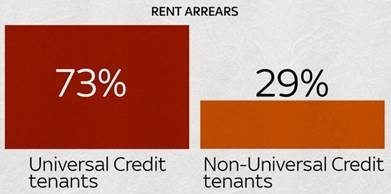Unfortunately there seems to be a growing trend which shows tenants who are claiming universal credit are getting themselves in arrears from the very...
Unfortunately there seems to be a growing trend which shows tenants who are claiming universal credit are getting themselves in arrears from the very beginning of a tenancy. Getting direct payment (known as alternative payment arrangements APA) or even discussing (explicit consent) the claim can prove to be a very difficult task unless you are asking the right questions.
Starting point – Do they pre-qualify to get APA?
Essentially you will need to build a case by using our unique tier 1 + 2 questionnaire forms. If a tenant has any of the below factors from tier 1, APA should be granted. If they have any tier 2 issues then multiple factors will need to be considered and will be answered on a case by case basis, NOTE: these must go hand in hand with the UC47 form.
https://directpayment.universal-credit.service.gov.uk/
Tier 1
- Drug, alcohol or other addiction problems.
- Learning difficulties, including literacy or numeracy problems.
- Severe or multiple debt problems.
- Being in temporary or supported accommodation.
- Homelessness
- Domestic violence or abuse
- A mental health condition
- Rent arrears
- Threat of eviction
- Repossession
- You are aged 16 or 17
- You are young and leaving care
Tier 2
- Having no bank account
- Third party deductions from your benefit. These are deductions to pay things like fuel bill arrears, and certain ongoing costs
- Being a refugee or asylum seeker
- Having a history of rent arrears
- Previous homelessness or living in supported accommodation
- Disability
- Having just left prison or hospital
- Recent bereavement
- Language skills, for example, if English isn’t your first language
- Having been in the armed forces
- Not being in education, employment or training
At the Home visit stage (as discussed in previous Eshots) or the move-in appointment – all evidence is verified and submitted along with our forms and put on the tenant’s online journal.
IMPORTANT!!!! – EXPLICIT CONSENT!!!
It crucial that the tenants put in the Journal to give NGU explicit consent to discuss the matter. This must be directly about the issue in question and not a general question or consent box like you would do with housing benefits – It will be denied if not done correctly.
Alternative Payment Arrangements (APA) can be made at ANY time during the tenancy – e.g if there were a rental appointment mid-tenancy we will do tier 1 and 2 forms again which are then uploaded at the appointment on the tenant journal.
The journal is LIVE so this gets picked up at the contact centre and is actioned that day (in theory).
If the claimant doesn’t respond, within 7 days then APA is automatically granted.
A landlord can also apply for arrears of rent to be deducted from a claimant’s UC (a Third Party Deduction). This can be also made on the UC47 form.
Anyway I hope you found this interesting and as you can see Univeral Credit is a completely new ball game – if you need advice do not hesitate to contact us.
Regards,
Katie Wybrant
New Lettings, Sales & Investments Manager



 posted by
posted by 


Share this with
Email
Facebook
Messenger
Twitter
Pinterest
LinkedIn
Copy this link